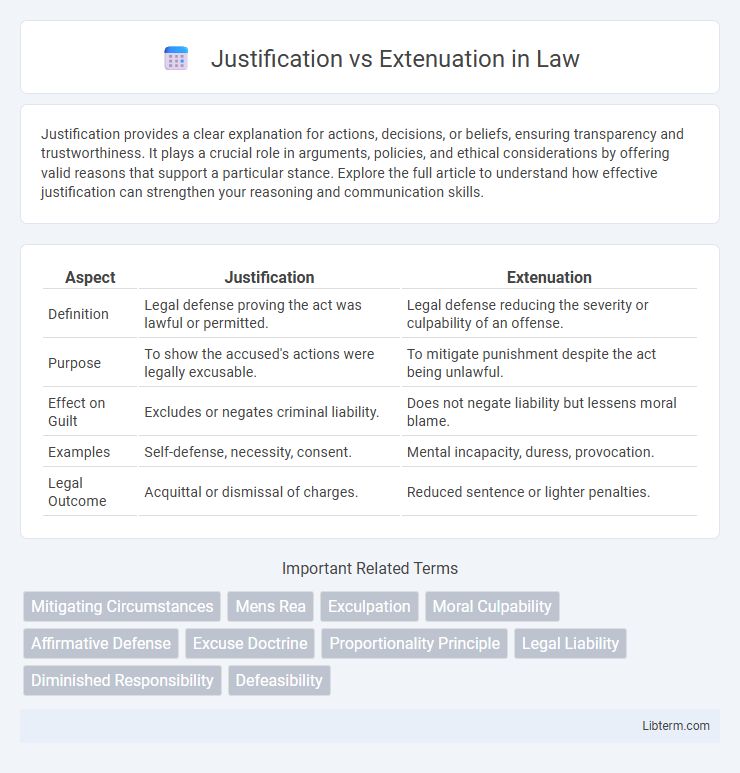Justification provides a clear explanation for actions, decisions, or beliefs, ensuring transparency and trustworthiness. It plays a crucial role in arguments, policies, and ethical considerations by offering valid reasons that support a particular stance. Explore the full article to understand how effective justification can strengthen your reasoning and communication skills.
Table of Comparison
| Aspect | Justification | Extenuation |
|---|---|---|
| Definition | Legal defense proving the act was lawful or permitted. | Legal defense reducing the severity or culpability of an offense. |
| Purpose | To show the accused's actions were legally excusable. | To mitigate punishment despite the act being unlawful. |
| Effect on Guilt | Excludes or negates criminal liability. | Does not negate liability but lessens moral blame. |
| Examples | Self-defense, necessity, consent. | Mental incapacity, duress, provocation. |
| Legal Outcome | Acquittal or dismissal of charges. | Reduced sentence or lighter penalties. |
Understanding Justification and Extenuation
Understanding justification involves recognizing actions deemed lawful or right based on context, such as self-defense or necessity, which validate behavior under specific conditions. Extenuation refers to factors that lessen the severity or culpability of an act, like diminished capacity or provocation, without fully excusing the conduct. Both concepts play crucial roles in legal defenses by influencing the degree of responsibility assigned to an individual.
Key Differences Between Justification and Extenuation
Justification refers to presenting valid reasons or evidence that prove an action was right or necessary, often used in legal contexts to demonstrate innocence or correctness. Extenuation involves acknowledging the wrongdoing but providing mitigating factors that reduce the severity or culpability, such as circumstances that lessen moral blame. The key difference lies in justification aiming to fully defend the action's legitimacy, while extenuation seeks partial excuse without denying the act's wrongfulness.
Legal Contexts: When Is Justification Applied?
Justification in legal contexts applies when a defendant's actions are deemed lawful under specific circumstances, such as self-defense or necessity, negating criminal liability. It serves as a complete defense by proving the act was socially acceptable or legally permitted despite the harm caused. Courts analyze the reasonableness and proportionality of the conduct to determine if justification applies.
Extenuation: Mitigating Circumstances Explained
Extenuation refers to mitigating circumstances that reduce the severity or culpability of a criminal act, potentially leading to lighter sentencing or penalties. These factors do not excuse the offense entirely but demonstrate reasons why the defendant's blameworthiness should be lessened, such as mental illness, duress, or provocation. Understanding extenuating circumstances is essential in legal contexts, as they influence judicial discretion and promote fairer outcomes in criminal justice.
Philosophical Perspectives on Justification and Extenuation
Philosophical perspectives on justification emphasize the alignment of actions with moral principles or laws, asserting that justified acts are inherently right or permissible under ethical frameworks such as deontology or utilitarianism. Extenuation, by contrast, focuses on the mitigation of moral blame or punishment by considering circumstances that lessen the severity of an action without rendering it entirely justifiable. Discussions around justification and extenuation often explore the tension between objective moral rules and subjective situational factors that influence moral judgment and legal responsibility.
Common Examples: Justification vs Extenuation in Practice
Justification occurs when a person's actions are deemed legally acceptable due to circumstances like self-defense or necessity, such as using force to prevent an imminent attack. Extenuation refers to factors that mitigate guilt without excusing the behavior, often leading to reduced sentences; examples include acting under duress or impaired mental capacity. Courts distinguish between justification and extenuation to determine whether conduct is lawful or merely less blameworthy, impacting the severity of legal consequences.
Impact on Sentencing and Punishment
Justification defenses, such as self-defense, negate criminal liability by proving the defendant's actions were lawful, often leading to acquittal and no punishment. Extenuation refers to mitigating circumstances, like diminished capacity, that do not excuse guilt but can reduce sentencing severity or result in lighter penalties. Courts weigh justification as a complete defense, while extenuation influences sentencing discretion, impacting the length and type of punishment imposed.
Moral Implications of Justifying Actions
Justification of actions involves providing morally acceptable reasons that render an act permissible under ethical standards, often invoking principles like self-defense or necessity. This concept maintains that the act aligns with societal norms and moral codes, thereby negating wrongdoing despite potentially harmful outcomes. Contrarily, extenuation acknowledges mitigating circumstances that lessen blame but do not fully absolve the actor from moral or legal responsibility.
The Role of Intent in Justification and Extenuation
The role of intent in justification and extenuation is crucial in criminal law, as justification involves actions taken with a lawful intent to prevent harm, such as self-defense, where the individual's intent aligns with legal standards for protection. Extenuation, on the other hand, acknowledges the presence of a wrongful act but reduces the offender's culpability by considering mitigating factors like lack of malicious intent or diminished mental capacity. Understanding intent helps differentiate when a defendant's actions are excused entirely (justification) versus when they are partially excused and result in lesser penalties (extenuation).
Justification vs Extenuation: Case Studies and Analysis
Justification and extenuation represent distinct legal defenses where justification involves proving an act was right under the circumstances, while extenuation acknowledges wrongdoing but seeks leniency due to mitigating factors. Case studies reveal that justification typically results in acquittal by establishing lawful or necessary actions, such as self-defense scenarios, whereas extenuation influences sentencing by highlighting factors like duress or diminished capacity. Analyzing court decisions underscores the importance of evidence in differentiating justified acts from those merely extenuated, affecting verdicts and judicial outcomes significantly.
Justification Infographic

 libterm.com
libterm.com